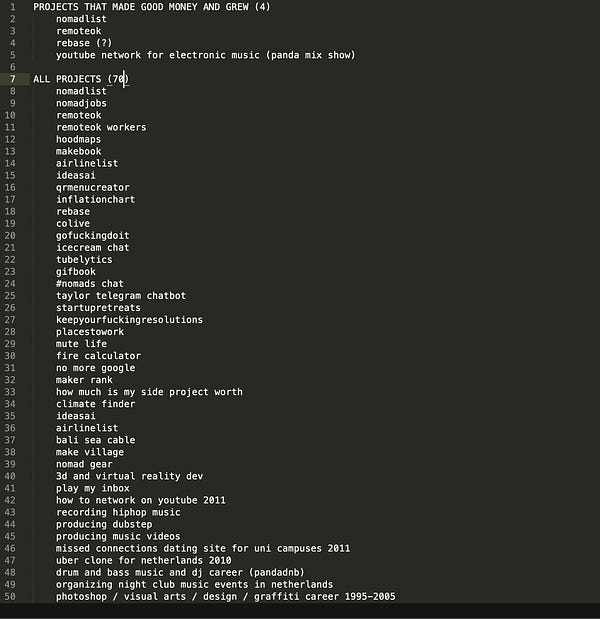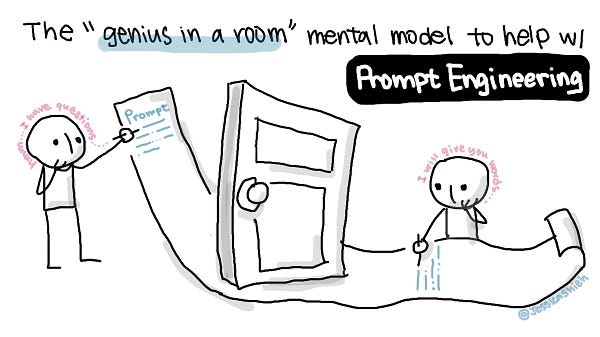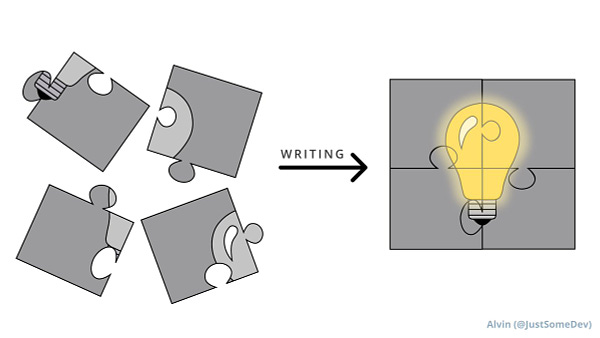Build small bets not startups, learn prompt engineering, principled product building
Edition 11th
Folks, startups are hard. PMF (product market fit) is a constant struggle initially and there's so much ambiguity. Amidst all kinds of uncertainty, I'm sure of a few indicators that help startups succeed
Shipping speed
Rapid experimentation
The short feedback loop
Human-centric product building
Stating in a simple way - Diversify, and build more small bets than focus on 'one' single product.
At my current startup, we are re-evaluating our products. We have built 4 products internally in the last 8 months, tested them with beta users, and reiterated post feedback as well.
We may scrap some of our products too, I crafted them with my own hands alongside talented team. I have learned to see my ideas/products as cattle and not as pets. It's hard to predict the future, it's too much randomness laden. IMHO what works is shipping good enough products, launching them fast and doubling down on what works, scrap what doesn't. Below tweets validates my points:




Also, startups shouldn't be too structured. We should let random experiments take place, and shouldn't depend only on research or data backed decisions.
Consider the story of the wheeled suitcase (From Antifragile by Nasim Taleb)
I carry a large wheeled suitcase mostly filled with books on almost all my travels. It is heavy (books that interest me when I travel always happen to be in hardcover).
In June 2012, I was rolling that generic, heavy, book-filled suitcase outside the JFK’s international terminal and, looking at the small wheels at the bottom of the case and the metal handle that helps pull it, I suddenly remembered the days when I had to haul my book-stuffed luggage through the very same terminal, with regular stops to rest and let the lactic acid flow out of my sore arms. I could not afford a porter, and even if I could, I would not have felt comfortable doing it. I have been going through the same terminal for three decades, with and without wheels, and the contrast was eerie. It struck me how lacking in imagination we are: we had been putting our suitcases on top of a cart with wheels, but nobody thought of putting tiny wheels directly under the suitcase.
Can you imagine that it took close to six thousand years between the invention of the wheel (by, we assume, the Mesopotamians) and this brilliant implementation (by some luggage maker in a drab industrial suburb)? And billions of hours spent by travelers like myself schlepping luggage through corridors full of rude customs officers.
Worse, this took place three decades or so after we put a man on the moon. And consider all this sophistication used in sending someone into space, and its totally negligible impact on my life, and compare it to this lactic acid in my arms, pain in my lower back, soreness in the palms of my hands, and sense of helplessness in front of a long corridor. Indeed, though extremely consequential, we are talking about something trivial: a very simple technology.
The story of the wheel itself is even more humbling than that of the suitcase: we keep being reminded that the Mesoamericans did not invent the wheel. They did. They had wheels. But the wheels were on small toys for children. It was just like the story of the suitcase: the Mayans and Zapotecs did not make the leap to the application. They used vast quantities of human labor, corn maize, and lactic acid to move gigantic slabs of stone in the flat spaces ideal for pushcarts and chariots where they built their pyramids. They even rolled them on logs of wood. Meanwhile, their small children were rolling their toys on the stucco floors.
The same story holds for the steam engine: the Greeks had an operating version of it, for amusement, of course: the aeolipyle, a turbine that spins when heated, as described by Hero of Alexandria. But it took the Industrial Revolution for us to discover this earlier discovery. Just as great geniuses invent their predecessors, practical innovations create their theoretical ancestry.
There is something sneaky in the process of discovery and implementation–something people usually call evolution. We are managed by small (or large) accidental changes, more accidental than we admit. We talk big but hardly have any imagination, except for a few visionaries who seem to recognize the optionality of things. We need some randomness to help us out–with a double dose of antifragility. For randomness plays a role at two levels: the invention and the implementation. The first point is not overly surprising, though we play down the role of chance, especially when it comes to our own discoveries.
But it took me a lifetime to figure out the second point: implementation does not necessarily proceed from the invention. It, too, requires luck and circumstances.
The history of medicine is littered with the strange sequence of discovery of a cure followed, much later, by the implementation–as if the two were completely separate ventures, the second harder, much harder, than the first. Just taking something to market requires struggling against a collection of naysayers, administrators, empty suits, formalists, mountains of details that invite you to drown, and one’s own discouraged mood on occasion. In other words, to identify the option (again, there is this option blindness). This is where all you need is the wisdom to realize what you have on your hands.
🐦 Tweets

Where are the NTFs, metaverse, and oh crypto? Lesson I learned the hard way is you can’t predict what will work and won’t. So the only viable strategy in all this uncertainty is to survive long enough to stumble on good opportunities.


💯 💯 No words are needed here.
🤖 AI news of the week
Well well, GPT-4 is here and it’s capabilities are actually scary!!.

🎧 Podcast
Embodying principles into a product as the best way to convey the principles to people. Enjoy 👇🏽
Have a great week,
Shivam







I agree with your thought of having multiple small bets. Now is the time.
Great point about implementation and progress taking time Shivam.
Reminded me of a great article I read recently: https://medium.com/accelerated-intelligence/marc-andreessen-blindspot-the-brutal-truth-about-life-changing-opportunities-we-overlook-every-day-705a252bc6e9
Ignore the title about Marc Andreesen. It's more about how progress and innovation are not linear, or obvious and are impacted by a lot of factors including chance.